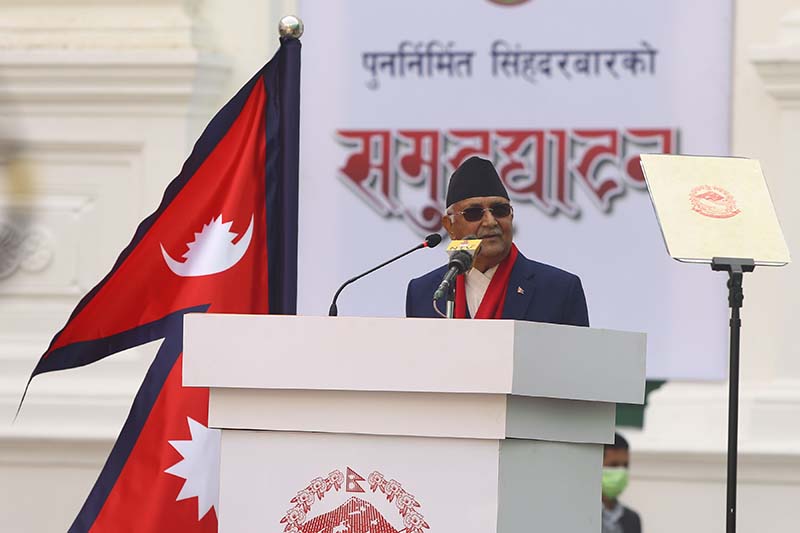

Prime Minister KP Sharma Oli has made public progress details of his three years in the government.
This took place at a function organised at Mulchowk right after the inaugural programme of Singha Durbar building reconstructed after it was damaged in the 2015 earthquake.
On the occasion, PM Oli defended that he had to dissolve the House of Representatives (HoR) and announce mid-term elections after his two-thirds majority government was obstructed from working.
Hurdles were created in appointing office bearers of constitutional commissions for the past three years and in approving many bills presented at the parliament three years ago, he maintained.
“I for the past years tried to shift difficulties having endured accusations so as not to go for elections before the normal timeframe. I continued my efforts until 2:00 pm on December 20 to convince leaders attacking the government or trying to replace it through different ways by accusing PM and chair of Nepal Communist Party (NCP) of criminal offences by a group belonging to the coalition government, and change the situation.”
It was appropriate to go for elections so as to prevent the remaining tenure of the lower house from turning into a ‘sports ground of political instability’, he opined.
Major achievements
Highlighting the major achievements of the government over the last three years, Prime Minister Oli mentioned the implementation of constitution and federalism; putting in place the necessary policy and legal arrangements and preparation of the institutional and physical infrastructures for that purpose; the encouraging overall economic situation; the rapid progress made in the post-earthquake reconstruction; and the encouraging progress made in the education, health and social security sectors.
In this connection, the PM stated that the size of public spending has increased by nearly 29 per cent and the size of the public budget has also grown by Rs 186.64 per cent. The per capita income has increased by 23.6 per cent (from 887 USD to 1,097 USD). More than 900 thousand people have been taken out of the absolute poverty line. If there weren’t COVID-19, this number would have crossed 1.5 million.
He said the UN Human Development Report shows that the Human Development Index (HDI) has increased by more than 5 per cent point, the poverty has not increased and there is no hunger in Nepal.
PM Oli said the insurance service has expanded by 8.7 per cent and the revenue mobilisation has reached more than Rs 100 billion. The inflation has not crossed 5 per cent despite the COVID-19 pandemic disturbing the supply chain and system globally.
He maintained that Rs 1,045 billion grants have been provided for the development of the provinces and local levels.
PM Oli also mentioned the reconstruction of the Ranipokhari as one of the achievements. He added that 559,461 private houses damaged by the 2015 Gorkha Earthquake have been rebuilt and that 95 per cent of the quake-damaged government buildings have been reconstructed.
Similarly, 5,498 kilometres of the road has been constructed in the last three years in the country despite the adverse impact of Coronavirus pandemic.
The Tarai-Madhes Prosperity Programme has been expanded and 1,080 community houses and 440 community infrastructure have been constructed under this.
PM Oli said the construction of the Postal Highway has made 68.2 per cent progress from 25 per cent, the Kaligandaki Corridor (Jomsom section) highway has seen 56 per cent progress, the Kaligandaki Corridor Highway (Palpa section) has made 20.5 per cent progress and the Kathmandu-Tarai Expressway has made 11.1 per cent progress in the last three years.
He stated that the North-South Karnali Corridor has made 23 per cent progress from 12.5 per cent and the rail, metro rail, monorail project has made 23.2 per cent progress from 8.8 per cent.
Similarly, he said the power production has increased by 333 megawatts (MW) and reached 1,430 MW. It is sure that 456 MW electricity would be added within this fiscal year. The electricity extension line of more than 66 KV capacity has been expanded to 4,251 kilometres, including 837 kilometres in this fiscal year. The population having access to electricity has increased by 6 per cent to reach 90 per cent.
According to the PM, the production of major cereal crops has increased by 11.2 per cent, that of fish and meat by 20 per cent, that of milk by 19 per cent and that of vegetable by 9 per cent. Irrigation has been expanded in the Tarai Madhes to more than 30 thousand hectares in the last three years.
School enrollment rate 93pc, literacy rate reaches 85pc
The government has, despite the year-long COVID-19 pandemic, achieved significant progress in education and communications sectors in the past three years.
During the last three years, the net enrollment rate in basic level ( class 1-8) has reached 93.4 per cent from 92.3 and this rate in the secondary level (class 9-12) has jumped to 47.6 per cent from 43.9 per cent. Similarly, the literacy rate above six years has increased from 78 per cent to 85 per cent and the CTVET schools have reached 292 local levels and their total number has reached 1,042 from 570. According to the government, 65,497 people are trained from such schools.
The Prime Minister during his address on the occasion of the completion of three years in the office today said the government was committed to the ‘ A World Ready to Learn’, the UNICEF’s global report.